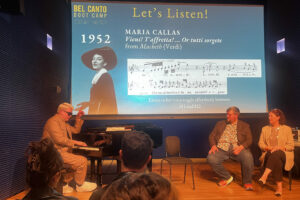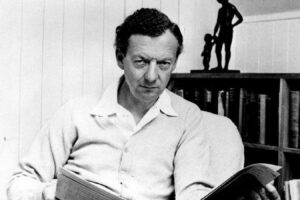

The result was La forza del destino, based on a Spanish tragedy with all the melodrama, mayhem and honor killing you’d expect, many characters turning up unexpectedly for seven long years (sometimes after fatal duels), monks, muleteers, soldiers, gypsies, beggars, the usual. Somehow it wasn’t manic enough for Verdi, who threw in a few scenes from Schiller’s Wallenstein for flavor.
This is a tale of true, thwarted, accursed love and how the world responds to so powerful a passion: By ignoring it. People have other things to do. But the love story winds on, destroying the principals, to heavenly melody.
The opera may be a mess but was once extremely popular. The Met saddened many of us by canceling the new production scheduled for next season, ostensibly for its expense. A few lucky New Yorkers were rescued from this dilemma by the New Amsterdam Opera Company, who presented Fidelio last year and were back, Friday night, at the Riverside Church Theater, for a concert Forza (orchestra and chorus, yes; sets and costumes, no) at $35 a ticket.
Why so few of New York’s opera lovers knew about this event is a question the management of this company should ponder—I found out about it by chance and others found out from my Facebook page.
The event was more enjoyable than anyone would have hoped for, several genuine Verdi voices among the cast, and the tragic part (aside from the fate of Leonora and Alvaro) is that only one performance was given. Given time to alert our Verdi-loving friends, a second would have been packed. It was Forza! It was a good Forza! That’s almost as rare as a good Gioconda.
Those considering a visit to the NAO should be warned that the opera was given without surtitles. I don’t like or (usually) need them; the last time I saw Forza, in Zagreb, the titles were in Croatian. I was delighted not to have them at Riverside. But consult your own prejudices here. The Riverside Church Theater, by the way, has far better acoustics than does Riverside Church—I’m told Amore Opera will present Donizetti’s La Zingara there in June.
The most striking singer in a fine cast was tenor Errin Duane Brooks, a George London Prize-winner, whose stentorian declamation, easily produced and flawlessly in tune, rang through the room. His diction, too, was clarity itself. It was a thrilling account that raised one doubt: Is Mr. Brooks able to sing softly? (Del Monaco had the same problem.)
Alvaro has many introspective scenes ( “O tu che in seno agli angeli” and its introduction, for example), and he seemed unable, or uninterested, in pulling back, letting a legato phrase do the work of persuading Leonora, Carlo, heaven, us, of his meaning. But if unsubtle, his singing was most enjoyable.
His Leonora, Kelly Griffin, has sung Lady Macbeth hereabouts, with Dell’Arte Opera Ensemble. She has a warm, powerful, clearly Verdian sound with a beautiful mid-range and, until she warms up, a shrill top. She was in full, gratifying, command by the time “Vergine degl’ angeli” rolled around, with great, serene pear-shaped phrases. (A Leonora di Vargas is also an Aida, and she sings that role too.)
Stephen Gaertner, whose dark, manly baritone thrives on such roles as Don Carlo, sang “Son Pereda, di ricco e d’onore” robustly but really hit stride in his duets with Alvaro and the double aria between those duets, the proper fiendish gleam arising in his earthy clash with Mr. Brooks’s metallic tenor. Both singers built tense excitement in this scene, and their rage had an inspiring fire.
Stefan Szkafarowsky, who sang Aleko at the New York City Opera last fall, provided Padre Guardiano with a similarly woolly but highly effective instrument. Daniel Klein, whose bass-baritone is rather effective than lyrical, played Fra Melitone’s comic moments and hypocritical ill temper to delicious effect. Janara Kellerman’s sizeable mezzo and its attractive color implied that she would triumph in the proper part, but Preziosilla—to my mind the most annoying role in all Verdi—was not that part.
She got through its crazy war-mongering without disgrace, which is all I ask of a Preziosilla, but Ms. Kellerman is more than ready to try on Amneris or Ulrica. Robert Brubaker, of all grandees, turned up to give us a fine whining Trabucco, of the minor characters perhaps the one least interested in the grand tragedy of which he is a spectator. The small chorus pulled itself together for “Vergine degl’ angeli”; the rest could be forgiven, but Forza needs that bit from the chorus.
Keith Chambers, the company’s director, is also its conductor. The ensemble were a trifle ragged, but the intensity of the overture proved contagious and the ensembles (the concertato at Hornachuelos, at the abbey, in the soldiers’ camp) held together nicely.
His choices of snips to make to keep the running time below four hours escaped the vigilance of all but the pedantic; the result flowed most impressively. His taste in scores to revive and singers to perform them is exceptional. With the loss of OONY, he fills a niche. I hope word spreads of his success and that other such occasions result.


























Comments